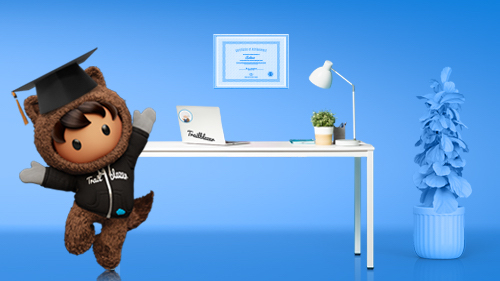
Get your FREE 30-day trial.
Please complete all fields.
As more and more companies are focused on putting customers at the center of their businesses and the digital transformation that it requires, the demand for Salesforce skills is on the rise. Salesforce and its ecosystems of customers and partners are creating a global economic engine, creating 3.3 million new jobs and more than $859 billion in new business revenues worldwide by 2022. That’s terrific news for our Trailblazers, who’ve worked hard to hone their skills, gain badges on Trailhead, and pass certifications.
There are over 2.5 million Trailblazers who use Salesforce to drive innovation, transform their companies, and grow their careers, with new Trailblazers joining every day. If you’re ready to take the next step and become a Salesforce professional yourself, this is the post for you. Here are ten tips for finding a career within the Salesforce economy.
We totally get it — you created a Trailhead account and you’re ready to earn badges and become Astro’s BFF. Maybe you already have an idea of your dream job within the Salesforce ecosystem, and maybe you don’t — either way, we can help you figure out your career options. First, start by exploring some of these Salesforce roles to see what interests you. You can also read some job descriptions to give you an idea of roles and responsibilities. Some common job titles are:
Salesforce Administrator
Salesforce Developer
Salesforce Business Analyst
Salesforce Consultant
Salesforce Architect
Salesforce Project Manager
Getting a job within the ecosystem is much easier when you have a built in network to guide and support you. Connect with your fellow Trailblazers on social media, and follow conversations using hashtags like #askforce. Join a user group in the Trailblazer Community, and get networking.
The Salesforce Ohana is a terrific and valuable resource for you to tap into, and Trailblazers are more than willing to help out newbies and seasoned pros alike. However, just remember that like any other family, there should be as much giving as there is taking. Find ways to be helpful to others, and you’ll be on your way towards building deeper connections.
There are plenty for you choose from of all sizes, all around the world. Local meetups in your town are invaluable for meeting people with similar roles. There are expert-led classes you can take virtually or in-person, and even learning conferences like Trailhead DX. And of course, there’s a little event called Dreamforce that manages to roll networking, learning, and giving back into four fun-filled days. Keep an eye on our events page for more opportunities.
Ideally, you’d have found your way towards a Salesforce job through your awesome networking skills, but if you haven’t and are applying cold, ensure that it’s both something you want and a job you’d be a good fit for. It’s tempting to blast out a bunch of resumes and apply for every dev or admin job you come across, but try thinking strategically. What size company do you want to work for — working for an enterprise will be very different from working for a startup even if it’s the same role. Is there a specific industry you want to target? Will you want to work in a city, a small town, or remotely? Consider how these factors will affect your life and lifestyle beforehand so you can apply with total confidence.
You’ll want to brush up on the things you’ve learned. Hitting a few trails or getting badges before you interview performs double-duty: 1. It helps you remember some of the more technical aspects of the job and 2. It boosts your confidence and reaffirms that you know your stuff.
Before any interview, you’ll want to do your due diligence and learn about the company you’re potentially joining. Look at their corporate values or mission statement – here’s ours for example. Look at the product offerings or services provided to get an idea of where you would fit in. Check out their blog and social channels to familiarize yourself with their company culture and recent news.
Interviewers will want to know about your technical skills, so be prepared. You can review study guides, past notes, or talk to others in the community to prepare. Here’s a sample list of questions other admins have been asked on interviews, and some for developers.
Take the time to get as much information from your interviewers as you can, and not just at the end of the interview, but throughout it. Find out what the company uses Salesforce for, and what the day-to-day expectations for the role are. How many users are there? Is there support for ongoing training? What projects or undertakings would they want your help with short-term and long-term?
Above all, try to relax, take a breath, and let yourself shine. You’ve worked hard and the future is bright for you, Trailblazer! Employers want to get to know you, your motivations, and your ideas for helping them, so let your passion for the job reveal itself.
10 down, 2 more days to go! Don’t miss any of our 12 Days of Trailblazing series: